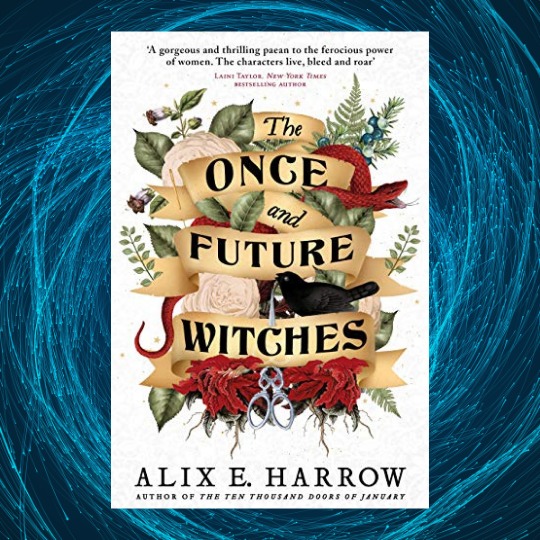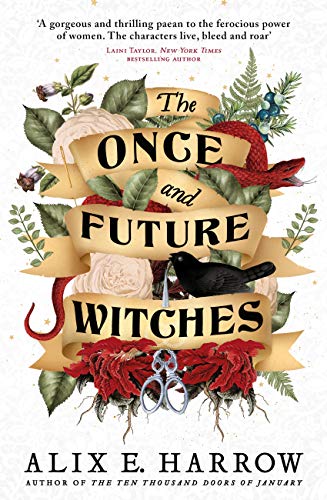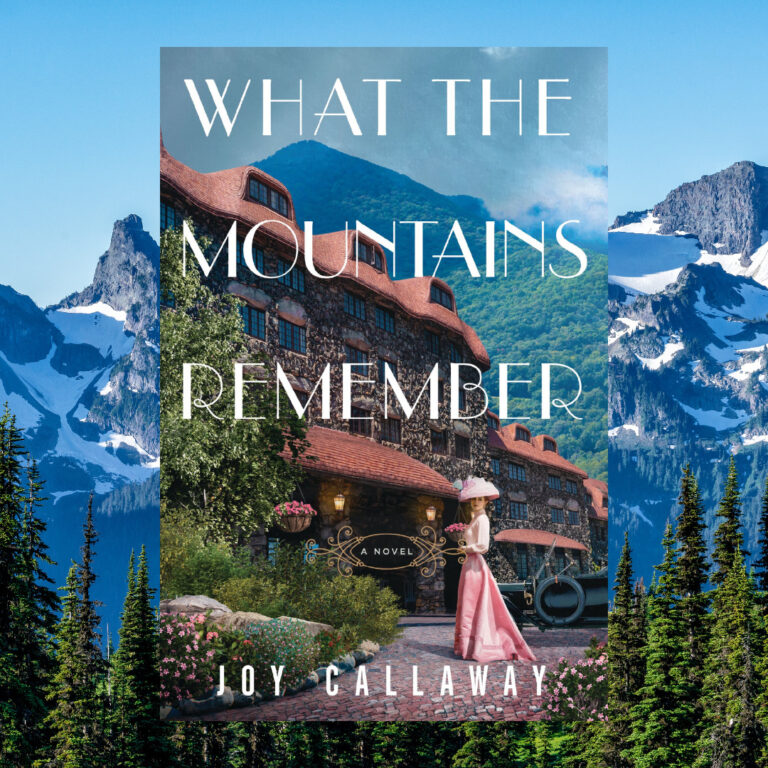We are excited to bring you this excerpt of The Once and Future Witches by Alix E. Harrow!
About The Once and Future Witches:
In the late 1800s, three sisters use witchcraft to change the course of history in Alix E. Harrow’s powerful novel of magic and the suffragette movement.
In 1893, there’s no such thing as witches. There used to be, in the wild, dark days before the burnings began, but now witching is nothing but tidy charms and nursery rhymes. If the modern woman wants any measure of power, she must find it at the ballot box.
But when the Eastwood sisters — James Juniper, Agnes Amaranth, and Beatrice Belladonna — join the suffragists of New Salem, they begin to pursue the forgotten words and ways that might turn the women’s movement into the witch’s movement. Stalked by shadows and sickness, hunted by forces who will not suffer a witch to vote — and perhaps not even to live — the sisters will need to delve into the oldest magics, draw new alliances, and heal the bond between them if they want to survive.
There’s no such thing as witches. But there will be.
An homage to the indomitable power and persistence of women, The Once and Future Witches reimagines stories of revolution, sapphic love, motherhood, and women’s suffrage–the lost ways are calling.
Excerpt:
Once upon a time there were three sisters.
James Juniper Eastwood was the youngest, with hair as ragged and black as crow feathers. She was the wildest of the three. The canny one, the feral one, the one with torn skirts and scraped knees and a green glitter in her eyes, like summer-light through leaves. She knew where the whip-poor-wills nested and the foxes denned; she could find her way home at midnight on the new moon.
But on the spring equinox of 1893, James Juniper is lost.
She limps off the train with her legs still humming from the rattle and clack of the journey, leaning heavy on her red-cedar staff, and doesn’t know which way to turn. Her plan only had two steps—step one, run, and step two, keep running—and now she’s two hundred miles from home with nothing but loose change and witch-ways in her pockets and no place to go.
She sways on the platform, buffeted and jostled by folk who have plenty of someplaces to go. Steam hisses and swirls from the engine, curling catlike around her skirts. Posters and ads flutter on the wall. One of them is a list of New Salem city ordinances and the associated fines for littering, profanity, debauchery, indecency, and vagrancy. One of them shows an irritable-looking Lady Liberty with her fist raised into the air and invites ALL LADIES WHO TIRE OF TYRANNY to attend the New Salem Women’s Association rally in St. George’s Square at six o’clock on the equinox.
One of them shows Juniper’s own face in blurred black and white above the words MISS JAMES JUNIPER EASTWOOD. SEVENTEEN YEARS OF AGE, WANTED FOR MURDER & SUSPECTED WITCHCRAFT.
Hell. They must have found him. She’d thought burning the house would muddy things a little more.
Juniper meets her own eyes on the poster and pulls her cloak’s hood a little higher.
Boots ring dully on the platform: a man in a neat black uniform strolls toward her, baton slap-slapping in his palm, eyes narrowed.
Juniper gives him her best wide-eyed smile, hand sweating on her staff. “Morning, mister. I’m headed to…” She needs a purpose, a somewhere-to-be. Her eyes flick to the irritable Lady Liberty poster. “St. George’s Square. Could you tell me how to get there?” She squeezes her accent for every country cent it’s worth, pooling her vowels like spilled honey.
The officer looks her up and down: hacked-off hair scraping against her jaw, dirt-seamed knuckles, muddy boots. He grunts a mean laugh. “Saints save us, even the hicks want the vote.”
Juniper’s never thought much about voting or suffrage or women’s rights, but his tone makes her chin jerk up. “That a crime?”
It’s only after the words come whipping out of her mouth that Juniper reflects on how unwise it is to antagonize an officer of the law. Particularly when there is a poster with your face on it directly behind the officer’s head.
That temper will get you burnt at the damn stake, Mama Mags used to tell her. A wise woman keeps her burning on the inside. But Bella was the wise one, and she left home a long time ago.
Sweat stings Juniper’s neck, nettle-sharp. She watches the veins purpling in the officer’s throat, sees the silver-shined buttons straining on his chest, and slides her hands into her skirt pockets. Her fingers find a pair of candle-stubs and a pitch pine wand; a horseshoe nail and a silver tangle of cobweb; a pair of snake’s teeth she swears she won’t use again.
Heat gathers in her palms; words wait in her throat.
Maybe the officer won’t recognize her, with her hair cut short and her cloak hood pulled high. Maybe he’ll just yell and stomp like a ruffled rooster and let her go. Or maybe he’ll haul her into the station and she’ll end up swinging from a New Salem scaffold with the witch-mark drawn on her chest in clotted ash. Juniper declines to wait and find out.
The will. Heat is already boiling up her wrists, licking like whiskey through her veins.
The words. They singe her tongue as she whispers them into the clatter and noise of the station. “A tangled web she weaves—”
The way. Juniper pricks her thumb on the nail and holds the spider-web tight.
She feels the magic flick into the world, a cinder spit from some great unseen fire, and the officer claws at his own face. He swears and sputters as if he’s stumbled face-first into a cobweb. Passersby are pointing, beginning to laugh.
Juniper slips away while he’s still swiping at his eyes. A puff of steam, a passing crowd of railroad workers with their lunch pails swinging at their sides, and she’s out the station doors. She runs in her hitching fashion, staff clacking on cobbles.
Growing up, Juniper had imagined New Salem as something like Heaven, if Heaven had trolleys and gas-lamps—bright and clean and rich, far removed from the sin of Old Salem—but now she finds it chilly and colorless, as if all that clean living has leached the shine out of everything. The buildings are all grayish and sober, without so much as a flower-box or calico curtain peeking through the windows. The people are grayish and sober, too, their expressions suggesting each of them is on their way to an urgent but troublesome task, their collars starched and their skirts buttoned tight.
Maybe it’s the absence of witching; Mags said magic invited a certain amount of mess, which was why the honeysuckle grew three times as fast around her house and songbirds roosted under her eaves no matter the season. In New Salem—the City Without Sin, where the trolleys run on time and every street wears a Saint’s name—the only birds are pigeons and the only green is the faint shine of slime in the gutters.
A trolley jangles past several inches from Juniper’s toes and its driver swears at her. Juniper swears back.
She keeps going because there’s no place to stop. There are no mossy stumps or blue pine groves; every corner and stoop is filled up with people. Workers and maids, priests and officers, men with pocket-watches and ladies with big hats and children selling buns and newspapers and shriveled-up flowers. Juniper tries asking directions twice but the answers are baffling, riddle-like (follow St. Vincent’s to Fourth-and-Winthrop, cross the Thorn, and head straight). Within an hour she’s been invited to a boxing match, accosted by a gentleman who wants to discuss the relationship between the equinox and the end-times, and given a map that has nothing marked on it but thirty-nine churches.
Juniper stares down at the map, knotted and foreign and unhelpful, and wants to go the hell home.
Home is twenty-three acres on the west side of the Big Sandy River. Home is dogwoods blooming like pink-tipped pearls in the deep woods and the sharp smell of spring onions underfoot, the overgrown patch where the old barn burned and the mountainside so green and wet and alive it makes her eyes ache. Home is the place that beats like a second heart behind Juniper’s ribs.
Home was her sisters, once. But they left and never came back—never even sent so much as a two-cent postcard—and now neither will Juniper.
Red rage swells in Juniper’s chest. She crumples the map in her fist and keeps walking because it’s either run or set something on fire, and she already did that.
She walks faster, faster, stumbling a little on her bad leg, shouldering past wide bustles and fashionable half-capes, following nothing but her own heartbeat and perhaps the faintest thread of something else.
She passes apothecaries and grocers and an entire shop just for shoes. Another one for hats, with a window full of faceless heads covered in lace and froth and frippery. A cemetery that sprawls like a separate city behind a high iron fence, its lawn clipped short and its headstones straight as stone soldiers. Juniper’s eye is drawn to the blighted, barren witch-yard at its edges, where the ashes of the condemned are salted and spread; nothing grows in the yard but a single hawthorn, knobbled as a knuckle.
She crosses a bridge stretched over a river the color of day-old gravy. The city grows taller and grayer around her, the light swallowed by limestone buildings with domes and columns and men in suits guarding the entrances. Even the trolleys are on their best behavior, gliding past on smooth rails.
The street pours into a broad square. Linden trees line its edges, pruned into unnatural sameness, and people flock around the center.
“—why, we ask, should women wait in the shadows while their fathers and husbands determine our fates? Why should we—we doting mothers, we beloved sisters, we treasured daughters—be barred from that most fundamental of rights: the right to vote?”
The voice is urgent and piercing, rising high above the city rumble. Juniper sees a woman standing in the middle of the square wearing a white-curled wig like some small, unfortunate animal pinned to her head. A bronze Saint George glares down at her and women press near her, waving signs and banners.
Juniper figures she’s found St. George’s Square and the New Salem Women’s Association rally after all.
She’s never seen a real live suffragist. In the Sunday cartoons they’re drawn scraggle-haired and long-nosed, suspiciously witchy. But these women don’t look much like witches. They look more like the models in Ivory soap ads, all puffed and white and fancy. Their dresses are ironed and pleated, their hats feathered, their shoes shined and smart.
They part around Juniper as she shoves forward, looking sideways at the seasick roll of her gait, the Crow County mud still clinging to her hem. She doesn’t notice; her eyes are on the strident little woman at the foot of the statue. A badge on her chest reads Miss Cady Stone, NSWA President.
“It seems that our elected politicians disagree with the Constitution, which grants us certain inalienable rights. It seems that Mayor Worthington disagrees even with our benevolent God, who created us all equal.”
The woman keeps talking, and Juniper keeps listening. She talks about the ballot box and the mayoral election in November and the importance of self-determination. She talks about the olden-times when women were queens and scholars and knights. She talks about justice and equal rights and fair shares.
Juniper doesn’t follow all the details—she stopped going to Miss Hurston’s one-room schoolhouse at ten because after her sisters left there was no one to make her go—but she understands what Miss Stone is asking. She’s asking: Aren’t you tired yet? Of being cast down and cast aside? Of making do with crumbs when once we wore crowns?
She’s asking: Aren’t you angry yet?
And oh, Juniper is. At her mama for dying too soon and her daddy for not dying sooner. At her dumbshit cousin for getting the land that should have been hers. At her sisters for leaving and herself for missing them. At the whole Saints-damned world.
Juniper feels like a soldier with a loaded rifle, finally shown something she can shoot. Like a girl with a lit match, finally shown something she can burn.
There are women standing on either side of her, waving signs and filling in all the pauses with hear-hears , their faces full of bright hunger. For a second Juniper pretends she’s standing shoulder-to-shoulder with her sisters again and she feels the hollowed-out place they left behind them, that emptiness so vast even fury can’t quite fill it.
She wonders what they would say if they could see her now. Agnes would worry, always trying to be the mother they didn’t have. Bella would ask six dozen questions.
Mags would say: Girls who go looking for trouble usually find it.
Her daddy would say: Don’t forget what you are, girl. Then he would toss her down in the worm-eaten dark and hiss the answer: Nothing.
Juniper doesn’t realize she’s bitten her lip until she tastes blood. She spits and hears a faint hiss as it lands, like grease in a hot pan.
The wind rises.
It rushes through the square, midnight-cool and mischievous, fluttering the pages of Miss Cady Stone’s notes. It smells wild and sweet, half-familiar, like Mama Mags’s house on the solstice. Like earth and char and old magic. Like the small, feral roses that bloomed in the deep woods.
Miss Stone stops talking. The crowd clutches their hats and cloak-strings, squinting upward. A mousy-looking girl near Juniper fusses with a lacy umbrella, as if she thinks this is a mundane storm that can be taken care of with mundane means. Juniper hears crows and jays calling in the distance, sharp and savage, and knows better.
She whirls, looking for the witch behind the working—
And the world comes unsewn.
About the Author:
Alix E. Harrow is an ex-historian with lots of opinions and excessive library fines, currently living in Kentucky with her husband and their semi-feral children. She won a Hugo for her short fiction, and has been nominated for the Nebula, Locus, and World Fantasy awards. Find her at @AlixEHarrow on Twitter.













